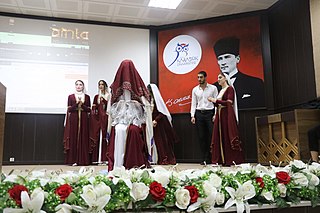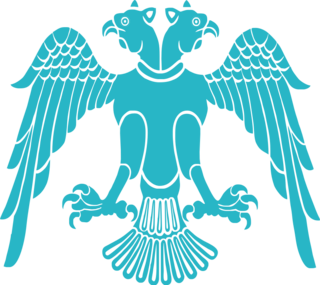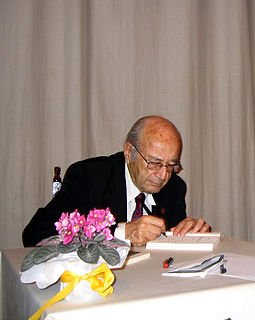Related Research Articles

Meskhetian Turks, also referred to as Turkish Meskhetians, Ahiska Turks, and Turkish Ahiskans, are an ethnic subgroup of Turks formerly inhabiting the Meskheti region of Georgia, along the border with Turkey. The Turkish presence in Meskheti began with the Turkish military expedition of 1578, although Turkic tribes had settled in the region as early as the eleventh and twelfth centuries.
Alparslan Türkeş was a Turkish politician, who was the founder and president of the Nationalist Movement Party. He represented the far-right of the Turkish political spectrum. He was and still is called Başbuğ ("Leader") by his devotees.
Turkish grammar, as described in this article, is the grammar of standard Turkish as spoken and written by educated people in the Republic of Turkey.

The Islamic Army of the Caucasus was a military unit of the Ottoman Empire formed on July 10, 1918. The Ottoman Minister of War, Enver Pasha, ordered its establishment, and it played a major role during the Caucasus Campaign of World War I.

The Seljuk dynasty, or Seljukids, also known as Seljuk Turks, Seljuk Turkomans or the Saljuqids, was an Oghuz Turkic Sunni Muslim dynasty that gradually became Persianate and contributed to the Turco-Persian tradition in the medieval Middle East and Central Asia. The Seljuks established both the Seljuk Empire and the Sultanate of Rum, which at their heights stretched from Iran to Anatolia, and were targets of the First Crusade.
Azerbaijanis in Turkey or Azerbaijani Turkish people are Azerbaijani people in Turkey, and are Turkish citizens and permanent residents of ethnic Azerbaijani background. It is difficult to determine the exact number of ethnic Azerbaijanis currently residing in Turkey since ethnicity is a rather fluid concept in Turkish culture. According to some estimates, there are currently around 800,000 Twelver Shias in Turkey, however this figure may differ substantially from the real one. Up to 300,000 of Azerbaijanis who reside in Turkey are citizens of Azerbaijan. In the Eastern Anatolia Region, Azerbaijanis are sometimes referred to as acem or tat. They are currently the largest ethnic group in the city of Iğdır and second largest ethnic group in Kars, where they constitute majority in the district of Akyaka .

Relations have always been strong between Azerbaijan and Turkey, and are often described as "one nation, two states" by the ex-president of Azerbaijan Heydar Aliyev due to both being Turkic countries.
Halil İnalcık was a Turkish historian. His highly influential research centered on social and economic approaches to the Ottoman Empire. His academic career started at Ankara University, where he completed his PhD and worked between 1940 and 1972. Between 1972 and 1986 he taught Ottoman history at the University of Chicago. From 1994 on he taught at Bilkent University, where he founded the history department. He was a founding member of Eurasian Academy.
Turks in Azerbaijan, or Turkish Azerbaijanis, refers to ethnic Turkish people who live in the Republic of Azerbaijan. The community is largely made of Ottoman Turkish descendants who have lived in Azerbaijan for centuries, as well as the Turkish Meskhetian community which arrived in large numbers during Soviet rule. More recently, there has been Turkish migration from the Republic of Turkey, as well as from other post-Ottoman modern nation-states and from the Turkish diaspora.

Women in Turkey are women who live in or are from Turkey. Turkey gave full political rights to women, including the right to elect and be elected locally in 1930. Granted by Mustafa Kemal Atatürk, Turkish women gained the right to elect and be elected before women in many European countries such as France, Italy and Greece. Article 10 of the Turkish Constitution bans any discrimination, state or private, on the grounds of sex. It is the first country to have a woman as the President of its Constitutional Court. Article 41 of the Turkish Constitution reads that the family is "based on equality between spouses".
İbrahim Özdemir is a Turkish philosopher, academic and an Islamic environmentalist. He is a professor of philosophy at Uskudar University and Director General of the Department of Foreign Affairs, the Ministry of National Education, Turkey.

Whole Azerbaijan is a pseudo-irredentist concept of uniting presumed historically Azerbaijani-inhabited territories into the Republic of Azerbaijan.

The International Organization of Turkic Culture is an international cultural organization of countries with Turkic populations, speaking languages belonging to the Turkic language family. Other than being an abbreviation of the former official name Türk Kültür ve Sanatları Ortak Yönetimi, Türksoy is also a compound noun in Turkish, made up of the words Türk (Turkic) and soy (ancestry).
Erol Şafak Sezer is a Turkish actor who usually appears in comedic roles.
The Battle of Yassıçemen was a battle fought in Anatolia, in what is now Erzincan Province, Turkey in 1230.

The Ahi Brotherhood, referred to as Ahi Republic by modern historians, was a fraternity, guild and a beylik based in modern-day Ankara in the 13th and 14th century Anatolia.

Hıfzı Topuz is a Turkish journalist, travel writer and novelist. He also served as a lecturer on journalism at several universities.

Sarı Süleyman Paşa was the grand vizier of the Ottoman Empire from 18 November 1685 to 18 September 1687. He was executed after the defeat of the Ottoman forces in the Battle of Mohács (1687).
Akif Çukurçayır is a Public Administration professor at Selçuk University in Konya, Turkey. His studies mainly focus on governance, citizen centered local politics, local administrations and political participation.

Turkic history is the common history between today's Turkic peoples. While the Göktürks were the first state established under the name of Turk, there were many Turkic tribes and states before the Göktürks.
References
- ↑ "Yasin aslan/ - search | Open Library".
- ↑ Yasin Aslan. Baltanin Sapi Bizden. Berikan Yayinlari, Ankara, 2009
- ↑ Yasin Aslan. Hazer Petrolleri, Kaskaf kör Dügümü ve Türkiye. Berikan yayinlari, Ankara. Birinci Baski 1997, Ikinci Baski 2005
- ↑ Can Azerbaycan: Karabag'da talan var. Kok sosyal ve stratejik arastirmalar serisi. Kok Yayinlari. 1990. ISBN 9789757721017.
- ↑ Yasin Aslan. Azerbaijani Press Discusses Link between Ecological Problems and Health. Report on the USSR, 1989/08
- ↑ "Turkish News - Latest News from Turkey".
- ↑ "Turkish News - Latest News from Turkey".
- ↑ "2023.gen.tr".
- ↑ "SeckinMail.com BBS". www.cafedost.com. Archived from the original on 2012-03-26.
- ↑ "ZAMAN Gazetesi Dunyadan Haberler". arsiv.zaman.com.tr. Archived from the original on 2011-09-29.
- ↑ "Yasin Aslan". www.yasin-aslan.com. Archived from the original on 2012-03-26.